- Home
- Georgette Heyer
Pistols for Two Page 20
Pistols for Two Read online
Page 20
‘Yes, and I fear he will prove to be very disagreeable.’
‘Are all your relatives disagreeable persons, Miss Trent?’ he enquired.
‘Certainly not! Mama, and my stepfather, and the children are the dearest creatures!’ she replied. ‘In fact, it is for them that I am going to Bath. If only my grandfather likes me better than Joseph, the boys may go to Eton, and Clara have lessons upon the pianoforte, and Mama another servant, and Papa – But this cannot interest you, sir!’
‘On the contrary. And is Joseph also bent on winning this fortune?’
‘Yes, and he does not need it in the least! You see, the case is that my grandfather quarrelled with both his daughters – my mama, and Joseph’s mama – because they married men he did not like. Mama says he was determined they should make splendid matches, and they did not. Mama ran away with my papa to Gretna Green – only fancy! He died when I was a baby, and I believe that he was not a very steady person. He was related to Lord Cleveland, and in the 1st Foot, only his family cast him off. So, I think, did the 1st Foot,’ she added reflectively. ‘Mama says he was very wild.’
‘Most of that family are,’ interpolated Sir Julian.
‘Oh, are they? I have never known them. Papa left poor Mama in sad straits, and if it had not been for my stepfather I don’t know what would have become of her. He married her, you see, and they are most happy! But Papa has a very small stipend, and there are five children, besides me, so that when my grandfather suddenly wrote to say that he felt his end to be approaching, and since he must leave his fortune to someone, I might go to spend Christmas with him, and perhaps he would leave it to me, it seemed as though it was my duty to go! And then I found that he must have sent for Joseph too, but I do think that he may like me better than Joseph, don’t you, sir?’
‘Miss Trent,’ said Sir Julian, ‘unless your grandfather is mad, you need have no doubts on that head!’
‘Yes, but I think he is!’ said Miss Trent candidly.
‘Who is he? What is his name?’
‘Kennet, and he lives in Laura Place.’
‘Good God, not the Miser of Bath?’
‘Oh, are you acquainted with him, sir?’
‘Only by reputation! Bath used to be full of tales of his oddities. I fear it is you who will not like him!’
‘No, but in such a cause one must stifle one’s feelings!’ said Miss Trent.
He agreed to it with becoming gravity, and for some miles entered in the fullest manner into all her plans for the advancement of her family.
The journey was a long one, and the weather inclement enough to have daunted most females, but Miss Trent remained cheerful throughout. Sir Julian, who had been sure, twenty-four hours earlier, that he had run through every emotion life could hold for him, realized by the time the outskirts of Bath were reached that he had fallen in love for the first time since his salad days.
It was dark when the curricle drew up before a house in Laura Place, and the street lamps had been lit. ‘Tired?’ Sir Julian said gently.
‘A very little,’ owned Miss Trent. ‘But you must be quite dead with fatigue, sir!’
‘I have never enjoyed a day more.’
Miss Trent said shyly: ‘I – I have not either!’
‘In that case,’ said Sir Julian, ‘let us go in and beard your grandfather!’
‘You too, sir?’ she asked doubtfully.
‘Certainly. I must ask his permission to pay my addresses to you.’
‘To – to – ? Oh!’ said Miss Trent in a faint voice.
‘Yes, may I do so?’
Miss Trent swallowed. ‘I have the most lowering feeling that I ought to say it is too sudden, or – or something of that nature,’ she confided.
‘Say what is in your heart! Would it displease you to receive my addresses?’
‘Well, no, it – it wouldn’t displease me – precisely!’ confessed Miss Trent, blushing in the darkness.
‘Then let us instantly seek out your grandfather!’ he said gaily.
They were admitted into the house by an aged retainer who reluctantly showed them into a bleak parlour on the ground floor. He left them with a single candle. Miss Trent said: ‘It is not very – very welcoming, do you think?’
‘Most quelling!’ said Sir Julian.
In a few minutes the door opened again to admit a buxom lady of uncertain years and improbable golden ringlets. She said without preamble: ‘Are you Mr Kennet’s Sophia? He’s that forgetful he must have forgotten to write! However, if you want to see him you may! Step upstairs with me, dearie! Don’t tell me this is Joseph you have brought with you!’
‘Who – who are you?’ gasped Miss Trent, utterly taken aback.
The lady bridled. ‘The name’s Flint,’ she said. ‘But I’m changing it. I was your grandpa’s housekeeper.’
‘Oh!’ said Miss Trent. ‘Then will you have the goodness to take me to my grandfather, if you please?’
Mrs Flint sniffed, but turned to lead the way up one pair of stairs. She opened a door giving on to a large parlour, and said: ‘Here’s your granddaughter, Mr K.!’
From a winged arm-chair by the fire a desiccated old gentleman peered at Miss Trent. ‘Well, it’s no use her coming here, because I’ve altered my mind,’ he said. ‘Maria’s girl, hey? Damme if you don’t look like her!’
Mrs Flint, who had taken up a position beside his chair, said with a simper: ‘Me and Mr K. is going to be married.’
‘It’ll be cheaper,’ explained Mr Kennet simply.
Miss Trent sank nervelessly into the nearest chair. Mr Kennet was meanwhile subjecting Sir Julian to a severe scrutiny. ‘A fine buck you’ve turned out to be!’ he pronounced. ‘What’s your name? Joseph?’
‘No,’ said Sir Julian. ‘My name is Julian Arden.’
Both Mr Kennet and his prospective bride stared very hard at him. ‘Mr K., if it isn’t Beau Arden himself!’ palpitated the lady.
‘Are you the son of Percy Arden, who was up at Oxford with me?’ demanded Mr Kennet. ‘Sir Julian Arden?’
‘I am,’ said Sir Julian.
‘What do you want?’ asked the old gentleman suspiciously.
‘To marry your granddaughter,’ replied Sir Julian coolly.
This intelligence produced an instant change in Mr Kennet’s attitude. He rubbed his dry hands together and ejaculated: ‘That’s good! That’s the girl! Come and give me a kiss, Sophy! I’m proud of you, and I’m sorry I said you was like your mother! Damme if I don’t do something handsome by you!’
Miss Trent, submitting unwilling to his embrace, was feeling too dazed by the shocks of the past few minutes to speak, but at this her eyes lit with a faint hope.
‘I will!’ said Mr Kennet, with the air of one reaching a painful decision. ‘You shall have your grandmother’s pearls!’
‘When we’re dead and gone, Mr K.,’ interpolated the future Mrs Kennet firmly.
‘Yes,’ agreed Mr Kennet, perceiving the wisdom of this. ‘And I’ll give her my poor Charlotte’s garnet brooch for a bride gift, what’s more! I can’t lay my hand on it at the moment, but I’ll send it. Where are you putting up, my dear?’
Sir Julian, perceiving that Miss Trent was quite stunned, took her hand in a comforting hold, and said: ‘She will be staying at the Christopher, sir. And now I think we must take our leave of you.’
Mr Kennet brightened still more at finding that he was not expected to entertain his grandchild and her betrothed to dinner, and said that if she liked she might come to visit him again before she left Bath. ‘But I won’t have your cousin Joseph coming to batten on me!’ he added, suddenly querulous.
‘Which leads one to wonder,’ remarked Sir Julian, when he had extricated Miss Trent from the house, ‘what is to become of Joseph!’
; ‘What is to become of me?’ said Miss Trent, wringing her hands.
‘You are going to marry me.’
‘Yes – I mean – But poor Mama! Bertram! Dear Ned! I have no right to be so happy when I have failed so miserably!’
He lifted her up into the curricle. ‘My little love, you have not so far given my circumstances a thought, but I must inform you that I am accounted to be extremely wealthy. Bertram, and Ned, and Tom shall go to Eton, and Oxford, and anywhere else you may choose; and Clara shall have her lessons on the pianoforte; and your mama shall have a dozen maids; and –’
‘Good God, you cannot be as rich as that!’ cried Miss Trent, quite frightened.
‘Much richer!’ he averred, mounting on to the box beside her.
‘But you must not marry me!’ she said, in great distress. ‘There must be dozens of eligible females whom you should rather marry!’
‘I am not the Grand Turk!’ he protested.
‘No, no, but you know I have no expectations!’
‘I know nothing of the sort,’ he said, possessing himself of her hand, and kissing it. ‘You are to inherit your grandmother’s pearls! But if I were you,’ he added, gathering up the reins, ‘I would not build too much upon that garnet brooch, my love!’
Full Moon
Lord Stavely prepared to descend from his chaise.
‘We will stop here,’ he announced.
It was certainly a charming inn. It stood at the end of the broad village street, with two great elms behind it and roses rambling over its old red brick frontage. It was not, of course, a posting house, which did not incline the two postilions in its favour. One of them said: ‘If we was to drive on for another mile or two, we’d likely find a decent house for your honour to bait at.’
‘My dear good fellow,’ replied his lordship, ‘you have no more notion of where we are than I have. Here we will stop. I like the place.’
The village seemed asleep in the moonlight, not a soul stirring. But the sound of carriage wheels brought the landlord out of the inn, all anxiety to oblige. Lord Stavely, alighting from the chaise, said: ‘Arcadia, I presume. Tell me, what is the time?’
The landlord, slightly taken aback, said that it lacked but ten minutes to the hour.
‘But what hour?’ asked his lordship.
‘Why, nine o’clock, sir!’
‘How shocking! Am I anywhere in the neighbourhood of Melbury Place?’
‘Melbury Place?’ repeated the landlord. ‘Yes, that you are, sir; it lies only a matter of ten miles from here, though the road’s tricky, as you might say.’
‘After the experiences of today, I should probably use a more forceful epithet. I imagine it will take me nearly an hour to reach the place. Obviously it behoves me to dine here. Or am I too late for dinner?’
The landlord was not one to turn away distinguished custom from his door. This gentleman, with his high crowned beaver hat, his driving coat of many capes, worn negligently open over a neat blue coat, a cut Venetian waistcoat, and the palest of fawn pantaloons, was plainly a member of the Quality. He assured Lord Stavely that, if he would step into the coffee-room, dinner should be served him in a very few minutes. A qualm then attacked him, and he faltered: ‘I’m sorry I can’t show your honour to a private parlour, but there’s only Mr Tom in the coffee-room, after all.’
‘Then if Mr Tom does not take exception to me, I shall do very well,’ said his lordship. ‘I wonder if I should remain here for the night? Shall I endear myself on my host by presenting myself at past eleven o’clock at night?’
‘They do keep very early hours up at the Place, by what I hear, sir,’ offered the landlord hopefully. ‘Was the Squire expecting of you, sir?’
‘He was, and I trust still is. Your manner leads me to fear that he will not be pleased by my tardy arrival?’
‘Well, sir, begging your pardon, Squire is that pernickety in his ways, and – in a manner of speaking – a testy gentleman – not meaning any disrespect, I’m sure!’
‘In fact, I shall not endear myself to him by arriving famished on his doorstep at dead of night. Very well. I’ll put up here, then.’
The landlord, mentally resolving to have the best sheets instantly put on the bed in the larger of his two guest chambers, ushered his lordship into the coffee-room.
It had only one occupant, a young gentleman who sat in the window embrasure, with a bottle of brandy on the ledge beside him, and a glass in his hand. The landlord, casting a rather worried glance at the bottle, murmured that Mr Tom would not object to a gentleman’s dining in the coffee-room. Mr Tom blinked at Lord Stavely, and inclined his head with dignity. He then resumed his scrutiny of the moon-washed street.
His lordship returned the civility by a slight bow, and a smile hovering about his mouth, but made no attempt to lure Mr Tom into conversation. It was apparent to him that care sat upon the young gentleman’s brow. It would have been apparent to someone far less acute than Lord Stavely that Mr Tom was, very properly, drowning his troubles in brandy. He might have been any age between nineteen and twenty-five; he was certainly not older. Leanings towards dandyism were betrayed by the intricate but not entirely successful arrangement of his cravat, and by the inordinate height of his shirt collar, whose starched points reached almost to his cheek-bones. But there was little of the dandy in his sturdy figure and fresh-complexioned countenance. He looked like the son of a country gentleman, which, indeed, he was, and as though he would be very much at home in the hunting-field, or with a gun over his shoulder.
In a short time the landlord laid a simple but very tolerable meal before his new guest, and himself waited upon him. Lord Stavely pronounced the fare to be excellent, commended the burgundy, and tactfully declined the only port offered him on the score that he did not wish to encourage a tendency to the gout. He did not look as though he suffered from gout, or any other ailment; in fact, he looked as healthy as any other man of thirty-five; but the landlord did not question his words. He merely swept away the covers and set a bottle of old cognac before him.
For some minutes past Lord Stavely had been aware that the young gentleman in the window was subjecting him to an intent scrutiny. He knew well what was engaging this fixed attention, and when the landlord had withdrawn, he said gently: ‘I call it the Nonchalent. It is not very difficult, once you acquire the knack of it.’
‘Eh?’ said the young gentleman, starting.
‘My cravat,’ explained Lord Stavely, smiling.
The young gentleman coloured and stammered that he begged pardon.
‘Not at all,’ said his lordship. ‘I’ll show you how to tie it, if you like.’
‘Will you?’ exclaimed the young gentleman eagerly. ‘I tie mine in an Osbaldeston, but I don’t like it above half.’
Lord Stavely waved one hand invitingly towards a chair at the table. ‘Won’t you join me?’
‘Well – thank you!’ The young gentleman got up and crossed the floor circumspectly. He brought his glass and the bottle with him, and set both down on the table. ‘My name,’ he announced carefully, ‘is Hatherleigh.’
‘Mine is Stavely,’ returned his lordship.
They exchanged bows. Only a purist would have said that Mr Hatherleigh was drunk. He could, by taking only reasonable pains, walk and speak with dignity, and if his potations had had the effect of divorcing his brain a little from the normal, at least it was perfectly clear on all important matters. When Lord Stavely, for instance, touching lightly on the country through which he had driven, said that he should suppose it to be good hunting country, young Hatherleigh was able to expatiate on the subject with enthusiasm and really remarkable coherence. The cloud lifted from his brow, his eyes brightened, and he became quite animated. Then the cloud descended again abruptly, and he fetched a sigh, and said gloomily: ‘But that is all at an end! I dar
e say I may think myself lucky if ever I get a leg across a good hunter again.’
‘As bad as that?’ said his lordship sympathetically.
Mr Hatherleigh nodded, and poured himself out some more brandy. ‘I’m eloping with an heiress,’ he announced dejectedly.
If Lord Stavely was startled by this intelligence, he managed to conceal his emotions most creditably. His lip did quiver a little, but he said in the politest way: ‘Indeed?’
‘Yes,’ said Mr Hatherleigh, fortifying himself with a deep drink. ‘Gretna Green,’ he added.
‘Forgive me,’ said his lordship, ‘but do you feel this to be a wise step to take?’
‘No, of course I don’t!’ said Mr Hatherleigh. ‘But what is a fellow to do? I can’t draw back now! You must see that!’
‘I expect it would be very difficult,’ agreed Lord Stavely. ‘When one has persuaded an heiress to elope with one –’
‘No such thing!’ interrupted Mr Hatherleigh. ‘I dare say I may have said it would be rare sport to do it, if only to kick up a dust, but I never thought Annabella would think I really meant it! But that is Annabella all over. In fact, I think she’s devilish like her father! Let her but once take a notion into her head, and there’s no persuading her to listen to reason! Mind, though,’ he added, bending a sudden, minatory scowl upon his auditor, ‘you are not to be thinking that I wish to back out! I have loved Annabella for years. In fact, I swore a blood-oath to marry her when we were children. But that isn’t to say that I want to drive off to the Border with her – and just now, too!’
‘The moment is not quite convenient?’
Mr Hatherleigh shook his head. ‘My uncle has invited me to Yorkshire for the grouse shooting!’ he said bitterly. ‘Only think what a splendid time I could have had! I have never tried my hand at grouse, you know, but I am accounted a pretty fair shot.’
‘You could not, I suppose, postpone the elopement until after the shooting season?’ suggested his lordship.
‘No, because if we waited there would be no sense in eloping at all, because very likely Annabella will be tied up to the old fogy her father means her to marry. Besides, the moon’s at the full now.’

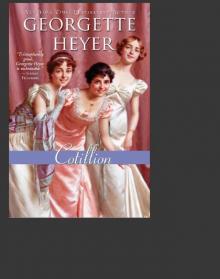 Cotillion
Cotillion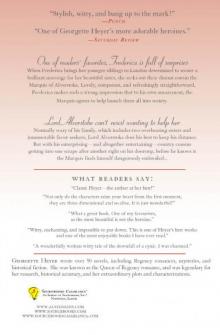 Frederica
Frederica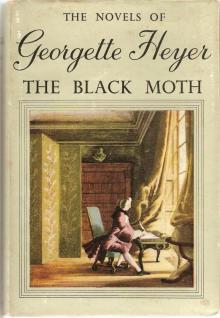 The Black Moth: A Romance of the XVIIIth Century
The Black Moth: A Romance of the XVIIIth Century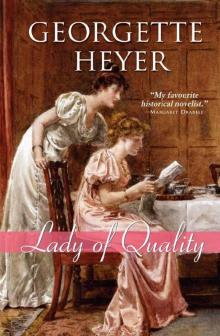 Lady of Quality
Lady of Quality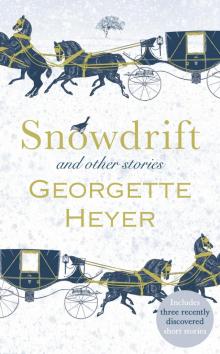 Snowdrift and Other Stories
Snowdrift and Other Stories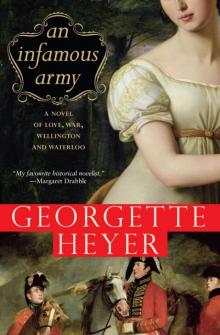 An Infamous Army
An Infamous Army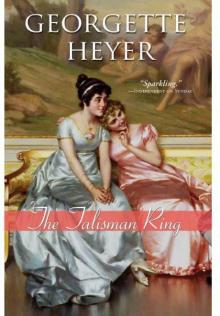 The Talisman Ring
The Talisman Ring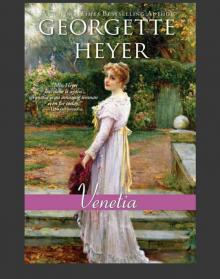 Venetia
Venetia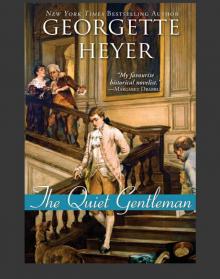 The Quiet Gentleman
The Quiet Gentleman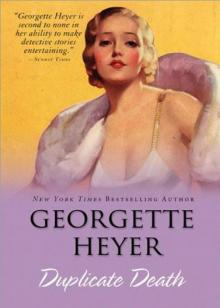 Duplicate Death
Duplicate Death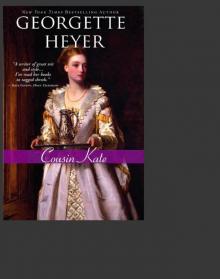 Cousin Kate
Cousin Kate Black Sheep
Black Sheep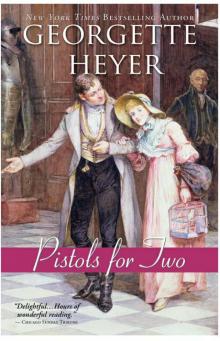 Pistols for Two
Pistols for Two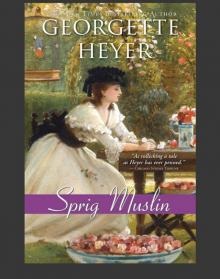 Sprig Muslin
Sprig Muslin No Wind of Blame
No Wind of Blame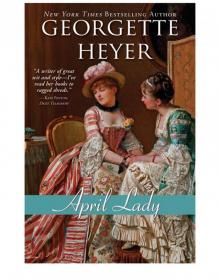 April Lady
April Lady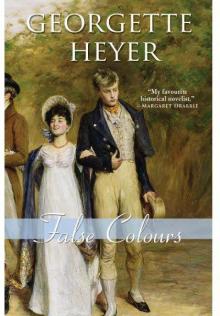 False Colours
False Colours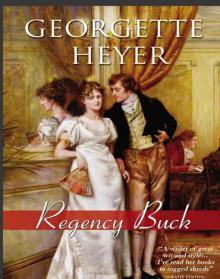 Regency Buck
Regency Buck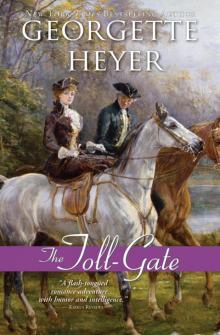 The Toll-Gate
The Toll-Gate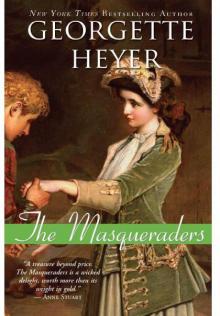 The Masqueraders
The Masqueraders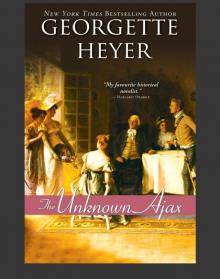 The Unknown Ajax
The Unknown Ajax The Grand Sophy
The Grand Sophy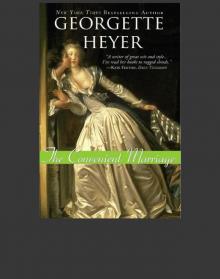 The Convenient Marriage
The Convenient Marriage Faro's Daughter
Faro's Daughter The Conqueror
The Conqueror The Foundling
The Foundling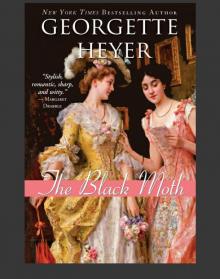 The Black Moth
The Black Moth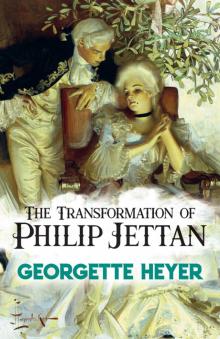 The Transformation of Philip Jettan
The Transformation of Philip Jettan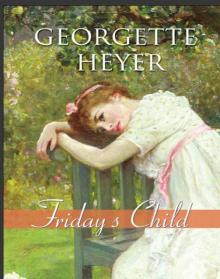 Friday's Child
Friday's Child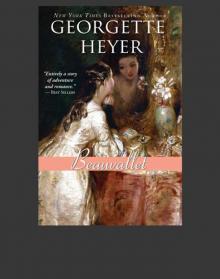 Beauvallet
Beauvallet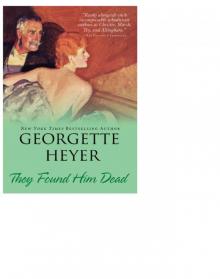 They Found Him Dead
They Found Him Dead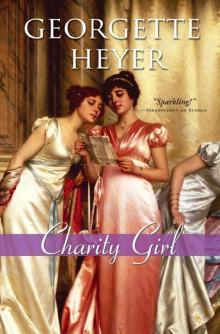 Charity Girl
Charity Girl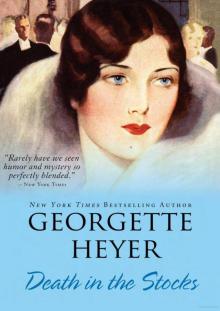 Death in the Stocks: Merely Murder
Death in the Stocks: Merely Murder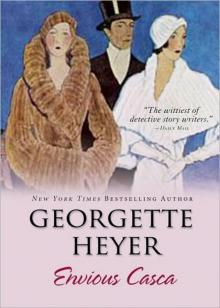 Envious Casca
Envious Casca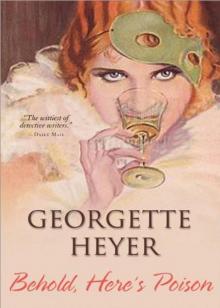 Behold, Here's Poison
Behold, Here's Poison Arabella
Arabella The Nonesuch
The Nonesuch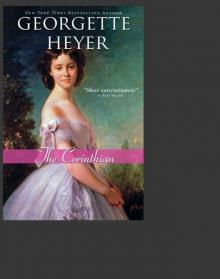 The Corinthian
The Corinthian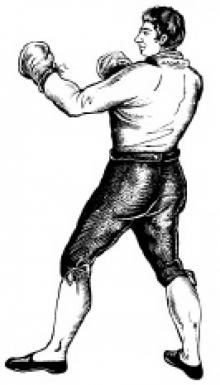 Jennifer Kloester
Jennifer Kloester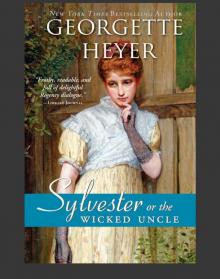 Sylvester
Sylvester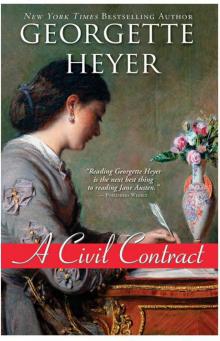 A Civil Contract
A Civil Contract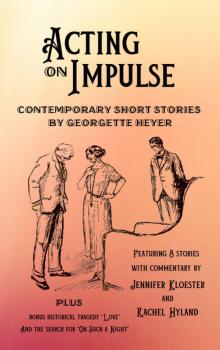 Acting on Impulse
Acting on Impulse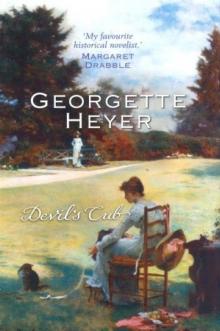 Devil’s Cub at-2
Devil’s Cub at-2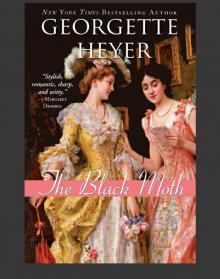 Black Moth
Black Moth Grand Sophy
Grand Sophy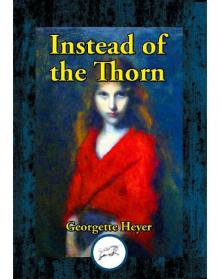 Instead of the Thorn
Instead of the Thorn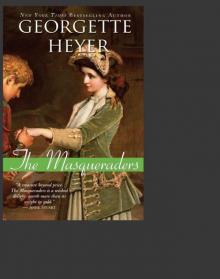 Masqueraders
Masqueraders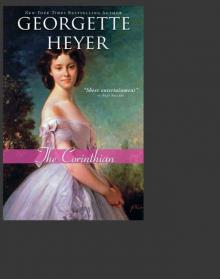 Corinthian
Corinthian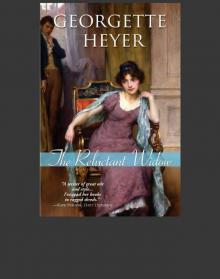 Reluctant Widow
Reluctant Widow